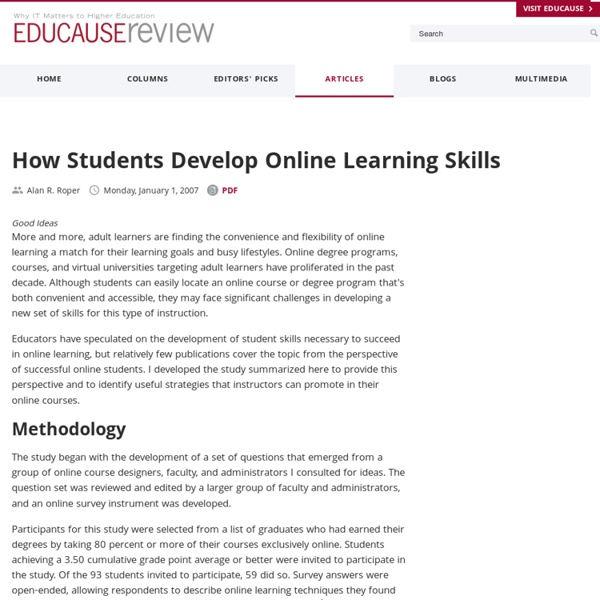How Students Develop Online Learning Skills

10 strategies for successful online learning
Thinking of enrolling in an online learning program? Before you get carried away with the notion that taking courses online will translate to a lighter workload, I should let you in on a little-known secret: Distance learning can actually be harder than taking courses in a traditional classroom. Why? Because YOU are responsible for your learning. As an online instructor, I've seen students make plenty of mistakes with distance learning, so here are some strategies I recommend to ensure the greatest level of success: #1. The biggest mistake online students make, in my opinion, is not taking online learning seriously enough. #2. One of the benefits of online learning is that it naturally lends itself to presenting material in a variety of ways, giving it the ability to reach all kinds of learners. #3. In 2007, EDUCAUSE surveyed 59 online students to determine what they felt were the biggest keys to their success. #4. #5. #6. #7. #8. #9. #10.
JOLT - Journal of Online Learning and Teaching
The Effectiveness and Development of Online Discussions Olla Najah Al-Shalchi Department of Modern Languages & Literatures College of William & Mary Williamsburg, VA 23187-8795 onalsh@wm.edu Introduction When people hear about distance education, they sometimes fear that students will be missing a great deal of interaction, communication, and participation. Types of Discussions and Their Benefits It is important to understand the various types of online discussions. When instructors decide to use synchronous discussions, they are choosing an environment that is more similar to face-to-face discussions because the students and instructors are meeting at the same time. Alternatively, asynchronous discussions have a number of benefits. All of these things lead to a development of critical thinking on discussion topics (Black, 2005). Concerns about Online Interactions An area of possible concern in online discussions is the subject matter being discussed. Clear Directions Instructor Feedback
Introduction to Online Learning: Are You Ready to Be an Online Learner?
"Change is the end result of all true learning." — Leo Buscaglia You’ve seen all those great commercials about attending school from home in your pajamas, or maybe you’ve heard from someone you know that taking university classes online is a wonderful solution for working parents who want to get a degree. It could be that you just want the freedom that seems to go with online learning. Tip #1: Consider What Type of Learner You Are and What Your Preferences Are Some of us like to have hands-on involvement when we are learning; others prefer listening to someone explain how to do something. Tip #2: Have the right personality for online learning Are you an outgoing, social person who enjoys being around people, or are you more introverted, preferring instead to work alone? Another aspect of personality to consider is your level of self-motivation. Tip #3: Consider your communication skills Think about how you typically communicate and which type of communication is your preference. Online
Assessing Implementation of blended Learning in Constrained Low Bandwidth Environment
What Makes a Successful Online Learner?
Two key advantages of online learning are flexibility and convenience. But online learning is a lot more challenging than it may seem. Are you considering taking some or all of your courses online? Good for you! But first, make sure you're ready to succeed. To see if you're ready, see how many items of the following skills you have: 1. Persistence is perhaps the biggest key to success in online learning. When you run into a challenge, keep trying and ask for help. 2. You must be able to manage your time well. This flexibility is one of the great benefits of online learning. Effective time-management skills don't just happen. Review the syllabus for each of your courses. It takes time to develop good habits, but you'll gain satisfaction from being well-organized and accomplishing your tasks. 3. Communication skills are vital in online learning because students must seek help when they need it. Use the tools provided by the school to communicate with your teachers. 4. 5. 6. 7.
Related:
Related:



